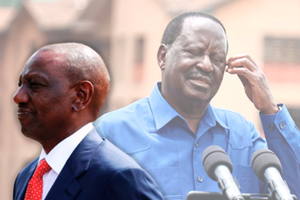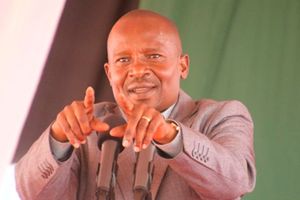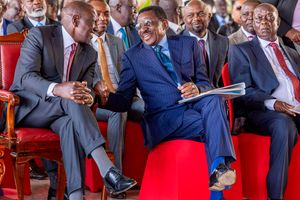
President William Ruto (center), and (from left) Kalonzo Musyoka, Martha Karua, Rigathi Gachagua and Fred Matiang’i.
As more politicians declare interest in the presidency ahead of the 2027 elections, there is one lingering concern: how to raise the billions needed for their campaigns.
The nascent coalition uniting the opposition – comprising former Deputy President Rigathi Gachagua, Wiper leader Kalonzo Musyoka, former Interior Cabinet Secretary Fred Matiang’i, People’s Liberation Party leader Martha Karua, DAP-K party leader Eugene Wamalwa, and former Cabinet Secretary Justin Muturi – is already developing a joint fundraising model that they hope will attract funding from both domestic and international sources.
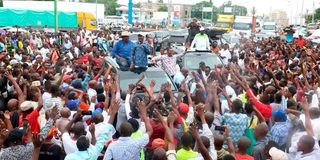
Wiper Party leader Kalonzo Musyoka and DAP-Kenya's Eugene Wamalwa accompanied by former Deputy President Rigathi Gachagua address residents of Changamwe in Mombasa County on June 7, 2025.
Conservative estimates suggest that Kenya’s presidential campaigns do not come cheap. Some seasoned strategists, who were part of the past presidential campaigns, say one requires at least Sh10 billion to mount a serious campaign. Some candidates have splurged as high as Sh20 billion in the past.
Ms Karua, in an exclusive interview in April, said that money determines a lot in a campaign, but sometimes the will of the people wins.
In 2002, she noted, the National Rainbow Coalition was modestly resourced and it was competing against a very well-resourced opponent.
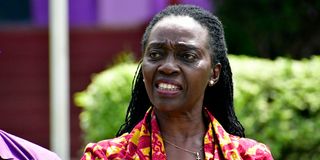
People’s Liberation Party (PLP) leader Martha Karua speaks to the media at the party headquarters in Nairobi on June 03, 2025.
“We didn't have money that I can tell you. We were competing against money,” she said.
From 2007 onwards, she said, “our politics became defined by money”.
“In 2007, the opposition, ODM, had more money than PNU,” Ms Karua said. “You remember the helicopters flying the sky?”
President William Ruto undoubtedly has a headstart over his 2027 opponents when it comes to resources, thanks to his position as incumbent president and the fact that state resources will be at his disposal during the campaign period.
In coalitions, the candidate who mobilises more resources is more likely to be chosen as the flag bearer or become a kingmaker.
In a race against time to bring its house to order and mobilise resources for the major task ahead, the Gachagua-Kalonzo opposition brigade has since set up a technical team to spearhead negotiations, policy alignment, and power-sharing frameworks in preparation for a united presidential challenge in 2027.
The opposition politicians on Friday launched meet-the-people rallies that will culminate into a closed-door meeting at the Coast this weekend, before the coalition-building technical committee begins its 10-day deliberations on Monday and reports to the principals.
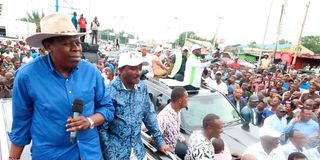
DAP-Kenya's Eugene Wamalwa (left), Wiper Party leader Kalonzo Musyoka (center) accompanied by former Deputy President Rigathi Gachagua address residents of Changamwe in Mombasa County on June 7, 2025.
At the heart of the new effort is the committee, a multidisciplinary team of legal, political, governance, and electoral experts handpicked by the principals to steer the alliance-building process.
It consists of two members each, from the six political parties and a representative of the Gen Zs and Persons Living with Disabilities.
According to the terms of reference seen by the Weekly Review, the committee will, among other things, deliberate on a financial roadmap for sustaining the coalition’s operations.
It will spearhead the registration and recognition of the coalition by the Office of the Registrar of Political Parties (ORPP), develop its legal framework, and craft its electoral strategy.
“It will also oversee dispute resolution mechanisms, data protection protocols, and a financial roadmap for sustaining the coalition’s operations,” an opposition strategist revealed.
Among its top tasks is drafting a coalition constitution, internal governance manuals, campaign frameworks, and above all, the financial management system.
Some wealthy members of the Mount Kenya Foundation have been approached by a political group seeking financial support for their activities.
These wealthy donors are often willing and ready to support candidates in the hope of advancing their interests in the event of a victory.
They are being pressured through a combination of blackmail and persuasion to support the cause, a move fraught with risk. Any confirmation by the State that they are funding the opposition’s activities would result in sanctions being imposed on them.
Tycoons and businessmen usually hedge their bets in case the elections go either way.
In the run-up to the 2022 polls, they supported both President Ruto and his main challenger – ODM leader Raila Odinga. Those who supported only Mr Odinga had to face punitive consequences after the general election after he lost to Dr Ruto.
Ahead of the 2017 elections, the bank accounts of the Kalonzo Musyoka Foundation were frozen by the NGO Coordination Board.
“The Central Bank of Kenya is advised to preserve all funds held at I&M Bank and/or in any other Kenyan bank under the name Kalonzo Musyoka Foundation until further notice from this office,” the board said.
Busia Senator Okiya Omtatah is also working on a financing model whereby he hopes his supporters will fundraise for him, a model which is famous in the West.
Here, members of the public who attend a candidate’s political rally expect to receive cash hand-outs.
Ms Karua said in her interview that the public has now been made to believe that when a person declares that they are going for a seat, “there is money that unlocks itself somewhere, which you're supposed to give to the people”.
“We've got to have this conversation and tell them that money-driven politics is corruption-driven politics. It is driving corruption in government, in Parliament and in every space. While people are busy looking for…money for the next election, people must learn that seeking for a seat and seeking good governance in a country is a community project, very much like that water project,” Ms Karua said.
Political strategists say the hunt for huge sums of money for campaigns has even led to massive corruption since no candidate’s salaries can amount to the required billions, forcing the contenders to seek for foreign funding, even some reaching out to “drug traffickers and known criminals.”
“Admittedly, clandestine funding of the presidential campaign is rampant and plays a pivotal role in the outcomes of Kenya’s elections. And this is true of almost all the elections since 1992 when it became clear that the one who gets at the helm of Kenya’s power can only get there through elections,” says Prof Peter Kagwanja, the Chief Executive Officer at the Africa Policy Institute .
Multimedia University of Kenya don Prof Gitile Naituli, one of Mr Odinga’s 2022 Azimio la Umoja One Kenya strategists, argues that a serious presidential war chest should be between Sh10 billion and Sh15 billion.
“We have a law on campaign financing which has, however, not been actualised. However, a serious presidential candidate, who wishes to dislodge a sitting president has to contend with the expensive campaigns which will require between Sh10 billion and Sh15 billion, based on the records from past campaigns,” Prof Naituli told the Weekly Review.
He says that financing has effects in the election in terms of movement and payment for staff allowances but “its effects on the election outcome is marginal.”
In the run-up to the August 2022 elections, the Independent Electoral and Boundaries Commission (IEBC) proposed to cap the presidential poll spending at Sh4.4 billion.
This would have meant that no political party could spend more than this amount during campaigns to popularise its presidential candidate to voters.
The 2021 notice, which was later shot down, was, political players said, an ideal situation suggestion, but the actual spending goes way beyond.
Now, with the 2027 elections around the corner, political strategists are working overtime to court tycoons, foreign lobbyists, and loyal contributors to bankroll the next wave of presidential and parliamentary campaigns.
The stakes are high – and so is the cost.
“Many of Kenya’s business magnates basically funded Raila Odinga in the last election through the Mount Kenya Foundation Forum and this was done in a public and visible way. In hotels, they would organize fundraising dinners in support of specific aspects of Odinga’s campaign,” says Prof Kagwanja. “There is also a huge number of businesses in Kenya that funded William Ruto’s campaign.”
Long-serving ODM national treasurer Timothy Bosire says presidential campaign financing is massive, but not easily quantifiable or uniform.
“Campaign money is huge”, he notes, “but difficult to put a figure to. It varies with context and candidate.”
He adds: “It involves extensive logistics – movement across the country, materials, and having agents in every polling station. You need a lot of personnel. These are costs you can’t avoid, and they pile up fast.”
Mr Bosire points out that incumbency comes with a clear edge because of “state machinery, established systems, and access to public resources, even if indirectly”.
As 2027 elections beckon, President Ruto’s camp appears to be ahead in terms of resources, and his team led by Deputy President Prof Kithure Kindiki has been leading huge fundraisers across the country.

Deputy President Kithure Kindiki speaks at Mukuyuni Township in Makueni County on June 5, 2025.
“This programme of supporting small-scale traders is a good one. Some leaders are despising it, claiming that we are bribing citizens. Does this look like a bribe? Do we look like people who bribe citizens?” Prof Kindiki posed.
The DP on Saturday again headed back to Lower Eastern where he pitched tent in Masinga and Kangundo constituencies in Machakos County.
A Kenya Kwanza strategist who participated in the coalition’s 2022 campaigns explained the thinking.
“Money means setting up offices, hiring staff, launching grassroots mobilisation drives, and organising party events – all of which require steady cash flow. While some outfits benefit from allocations by the Political Parties Fund and monthly contributions from elected officials, this is barely enough to keep them running, let alone mount a presidential campaign,” he said.
Mr Gachagua is expected to formally unveil his Democracy for the Citizen’s party (DCP) after a dramatic exit from the ruling United Democratic Alliance.
His long-delayed party launch is reportedly being planned as a show of political muscle and financial might.
“It will be grand,” a close ally told the Weekly Review. “We are mobilising delegates and crowds from across the country. It’s not just a launch, it’s a statement that we want to make.”
Dr Matiang’i, who has since issued a three-month exit notice from the World Bank to try his luck in the presidency, has reportedly been working with the international circuit.
Regulatory filings last year showed he has retained Canadian-based Dickens and Madson, which was to be paid Sh32.5 million to lobby the executive and/or legislative branches of the governments of powerful nations including the US, UK, Japan, Kenya and any other mutually agreed upon country or countries, and international organisations on the former minister’s behalf.
Within coalitions, presidential hopefuls are quietly being evaluated not just on their popularity — but on their ability to “bring something to the table”.
Candidates are even asked how much they are able to commit, and that’s how you fail if you quote something that does not make any sense. That’s why Raila has been able to run for a record five times,” an ODM MP told the Weekly Review.


